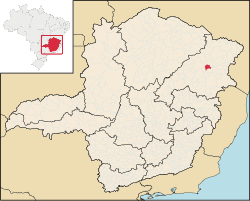Padre Paraíso is a Brazilian municipality located in the northeast of the state of Minas Gerais. Its population as of 2020 was estimated to be 20,252 people living in a total area of 543 km2.[2] The city belongs to the mesoregion of Jequitinhonha and to the microregion of Araçuaí. It became a municipality in 1962.
Padre Paraíso | |
|---|---|
Municipality | |
 BR-116 in the city | |
 | |
| Country | Brazil |
| State | Minas Gerais |
| Incorporated | 30 December 1962 |
| Government | |
| • Mayor | Diego Ferdinando Mendes Oliveira (Solidariedade) |
| Area | |
| • Total | 543,942 km2 (209 sq mi) |
| Population (2020) | |
| • Total | 20,252[1] |
| • Density | 36.3/km2 (94/sq mi) |
| Demonym | Padre-paraisense |
| Time zone | UTC−3 (BRT) |
| Postal Code | 39818-000 |
| Area code(s) | +55 33 |
| Website | padreparaiso.mg.gov |
Padre Paraíso is located on the Rio-Bahia highway (BR-116) at an elevation of 664 meters (center of the town). The climate is semi-arid and the region is mountainous.
The economy is based on cattle raising, services, and subsistence agriculture, with the main crops being coffee, beans, manioc, sugarcane, and corn. The cattle herd had 8,000 head in 2006. In 2005 there were 639 rural producers but only 7 tractors. 2,100 persons were dependent on agriculture. As of 2005 there were 17 health clinics and 1 private hospital with 42 beds. Educational needs were met by 23 primary schools, 3 middle schools and 4 nursery schools. There were 959 automobiles in 2006, giving a ratio of 17 inhabitants per automobile (there were 790 motorcycles). There was 1 bank in 2007.[3]
Neighboring municipalities are: Ponto dos Volantes - Caraí - Araçuaí. The distance to Belo Horizonte is 542 km. The distance to the nearest major population center, Teófilo Otoni is 94 km.[4] [5]
Social indicators
editPadre Paraíso is ranked low on the MHDI and was one of the poorest municipalities in the state and in the country in 2000.
- MHDI: .656 (2000)
- State ranking: 726 out of 853 municipalities
- National ranking: 3,673 out of 5,138 municipalities in 2000
- Life expectancy: 67
- Literacy rate: 70
- Combined primary, secondary and tertiary gross enrolment ratio: .774
- Per capita income (monthly): R$94.00 [6]
The above figures can be compared with those of Poços de Caldas, which had an MHDI of .841, the highest in the state of Minas Gerais. The highest in the country was São Caetano do Sul in the state of São Paulo with an MHDI of .919. The lowest was Manari in the state of Pernambuco with an MHDI of .467 out of a total of 5504 municipalities in the country as of 2004. At last count Brazil had 5,561 municipalities so this might have changed at the time of this writing.[6]
See also
editReferences
edit- ^ IBGE 2020
- ^ IBGE 2020
- ^ IBGE
- ^ Distancias Minas Gerais
- ^ Citybrazil Archived 2008-05-01 at the Wayback Machine
- ^ a b "Frigoletto". Archived from the original on 2011-07-06. Retrieved 2008-07-26.
17°04′S 41°29′W / 17.067°S 41.483°W

